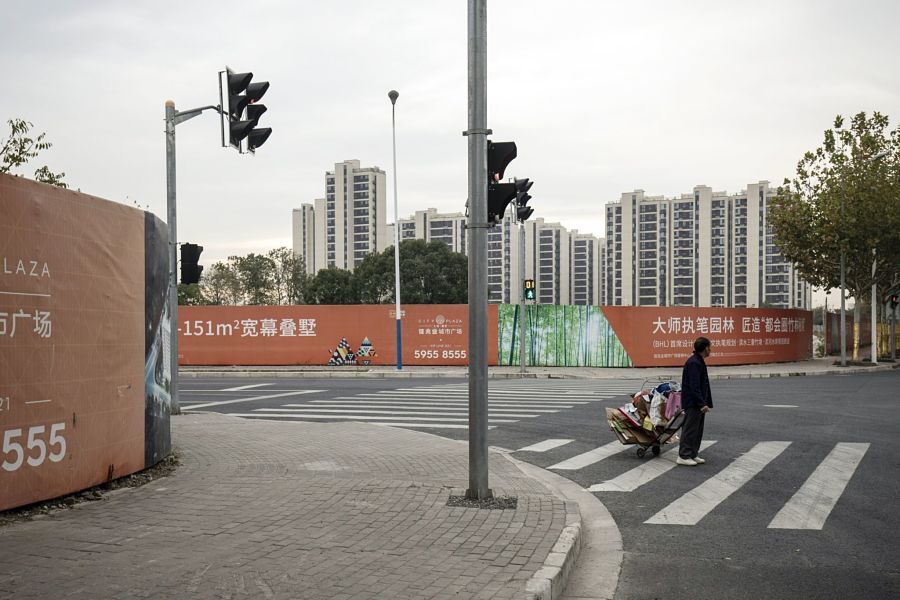The debt crisis engulfing the real estate sector in China is threatening to upend developers that have borrowed billions in green debt to fund sustainable buildings.
Two prominent firms that are struggling to meet their debt obligations, Kaisa Group Holdings Ltd. and Fujian Yango Group Co., now face “inevitable” default scenarios, according to S&P Global Ratings, which cut both issuers’ credit ratings deep into junk territory before withdrawing its assessment on both earlier this month. Together, the developers and their units sold at least $1.9 billion in ethical debt.
Kaisa faces a crucial test as it seeks to extend payment on a $400 million sustainability note due Dec. 7 to avoid a possible default or restructuring. A failed exchange could result in the first missed payment on a sustainability note by a Chinese borrower since at least 2018, Bloomberg-compiled data show.
Chinese developers touted their sustainable credentials and raised green bonds to fund a host of new environmentally focused buildings in a global rush for ethical finance in recent years. Now those projects and the debt used are in doubt as the builders deal with a contagion of market distress following China Evergrande Group’s troubles.
Kaisa is planning to put 18 projects in Shenzhen up for sale with a total value of $12.8 billion, and has another 95 urban renewal projects in the city that may also be added to the pipeline. This will include at least one project funded in part by its sustainability bonds, according to people familiar with a briefing by the firm’s executives. One of Kaisa’s landmark green buildings in the city includes a 50-floor fintech center designed to look like a bundle of chopsticks.
Kaisa and Yango did not respond to Bloomberg requests for comment.
The broader liquidity crisis engulfing the real estate sector, as authorities move to clamp down on debt-fueled growth, is also putting green developments at risk. It may stymie efforts to attract global investors to fund China’s ambitious long-term carbon neutral targets, just as financial institutions with $130 trillion in assets commit to meet climate goals set out in the Paris agreement.
The $13.6 billion in outstanding green bonds sold by property firms have been dragged down by historic declines in China’s offshore junk bonds, which are dominated by real estate borrowers. The dramatic sell-off in those riskier notes has sent yields to as high as 25% with prices now at 75 cents on the dollar. That, in turn, has triggered the average prices for green property debt sold offshore to tumble about 39 cents on the dollar to 68 cents.
Kaisa’s 2021 bond fell to about 46 cents on the dollar Friday, a day after the company announced its exchange proposal, Bloomberg-compiled prices show. Another sustainability bond sold by Kaisa traded at around 33 cents. The company had missed a deadline to pay two dollar bond coupons and hired financial and legal advisers earlier this month.
A Yango unit’s green bond due 2025 is indicated at around 30 cents after the firm’s property subsidiary last week narrowly avoided default with a debt extension.
Some green borrowers have already fallen victim to the liquidity crisis. Modern Land China Co. defaulted on a green dollar bond in late October after failing to negotiate a payment extension. It was the first mainland firm to sell green debt on the Hong Kong stock exchange in 2016, and has some $1.3 billion of outstanding green offshore bonds, including the delinquent note. Holders of the borrower’s ESG debt included BlackRock Inc. and HSBC Holdings Plc, according to the latest available data compiled by Bloomberg.
China’s green property bond sales had boomed before Evergrande’s debt crisis, to make up about 47% of the nation’s environmentally-focused offshore debt this year. The recent sell-off also highlights the problems for overseas investors choosing to buy green debt: nearly 90% of China’s offshore green property notes are speculative-grade debt.
That adds to concerns of greenwashing amid confusion over ambiguous or incoherent green standards. The sector is relatively carbon-intensive, given that housing construction contributes to about 20% of China’s emissions.
The pressure on Chinese property firms is unlikely to let up, even as signs of the crisis easing have prompted a precarious rally in some riskier debt. Prohibitively high borrowing costs may mean many developers are effectively shut out of the offshore credit market to refinance imminently maturing dollar debt.








